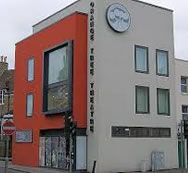This is the question asked at The Orange Tree theatre with considerable wit but with a confusing end, discovers Liz Vercoe
|
The 2006 play It Just Stopped by Australian playwright Stephen Sewell opens on a typical morning most of us would recognise. A young, well-educated couple dash about their apartment ready to start the working day. Their American accents, high-rise building and talk of garbage chutes places them, for most British viewers, in Manhattan, but later it becomes apparent they are relocated to Australia.

Joseph Kloska and Emma Pallant
Franklin, played by Joseph Kloska, is a freelance arts journalist with a deadline to meet; his wife Beth (Emma Pallant) is their main breadwinner as a producer of an exploitative radio chat show. It’s business as usual until Franklin finds his computer is dead and Beth that the lift is not working. Both immediately retreat into what that means for them personally, a flash of selfishness that flames up increasingly forcefully throughout the play as they are stripped, bit by bit, of all that is physically familiar to them.
But their relationship still crackles with jokes. When Franklin wonders if there has been a disaster at street level and worriedly says: “Perhaps we’re above it all”, Beth quips to cheer him up “Of course we’re above it all, we went to Harvard.” Both believe their intellect will see them through.
In this play Sewell seems to want to make the point that Americans are less worldly than, say Australians, and therein lies the cause of a great number of the world’s problems. Certainly this couple are strange in that they become too scared to leave the apartment, even to knock on a neighbour’s door. Sure, occasionally these days someone dies without the neighbours knowing and headlines scream about our uncaring society, but it’s still rare.
Joseph Klost’s Franklin is constantly frantic as his character is basically asked to articulate all of modern, western society’s fears: of strangers, of not knowing how anything really works from plumbing to getting milk from cow to fridge, of terrorism and international politics, of religious difference and of anarchy.
Channel 4’s recent TV docu-drama “Blackout” covered much of the same “what if” ground more scarily, but six years after this play was written.
Emma Pallant’s Jewish Beth is delightfully cool and wry, shaken only when her husband attempts to tell her Wagner’s music had nothing to do with the anti-Semitic German society he composed for.
And so they are paralysed by inertia, batting philosophical ideas to and fro until a bombshell is lobbed into their entertaining self-padded cell in the shape of two loud-mouthed Australian neighbours: Bill, played by John Bowler, and Pearl (Cate Debenham-Taylor) pictured below.

As an attack on most comfortably off, well-mannered people in the west being too head-in-the sand about the world’s problems this play is not 100 per cent successful, mainly because the second act is somewhat confusing. This may be intentional since the play is all about breakdown of society as we know it, but the second half interweaves mental breakdown, the malign influence and power of money, and NIMBYism on a global scale. Oh, and some good jokes.
Pearl is wonderfully scary as a drunk on a rampage with a deadly weapon and Bill even more disturbing as a devilish millionaire businessman conjuring up various fires-from-hell scenarios. But, entertaining as it is, because none of the characters are that sympathetic, except maybe Beth, and by the end you don’t even know what time of day it is, morning coffee or evening cocktails, let alone whether there is an external emergency or not, it doesn’t make you want to rethink your life.
Liz Vercoe
February 10, 2014
